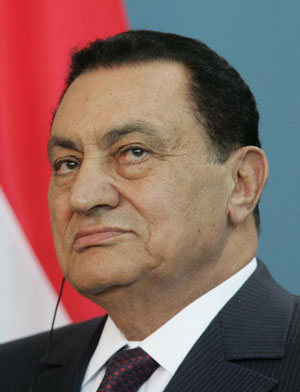Egypt peace plan well received, but may not boost Mubarak
 Cairo - An Egyptian ceasefire plan for Gaza which Egyptian President Hosny Mubarak hopes will help his damaged popularity has met a positive reaction since it was announced late on Tuesday.
Cairo - An Egyptian ceasefire plan for Gaza which Egyptian President Hosny Mubarak hopes will help his damaged popularity has met a positive reaction since it was announced late on Tuesday.
Seeking to regain regional stature damaged by Israel's attack on Gaza, Mubarak proposed a ceasefire plan that won immediate backing from the US and Europe, even though few details have been announced.
Mubarak's proposal included an immediate ceasefire from Israel and Palestinian factions so that aid can reach civilians; the involvement of international forces; and mechanisms to prevent future conflicts such as controlling the borders and easing the blockade of Gaza.
"Reactions from US, Europe, Israel and the Palestinian Authority have been positive so far," political analyst Diaa Rashwan told Deutsche Presse-Agentur, dpa.
However, agreement from Hamas may be harder to secure without amendments, Rashwan said. Both Hamas and Israel have said they are studying the proposal.
Hamas insists on an immediate ceasefire, ending the Gaza blockade and opening all crossings to Gaza. But it has disagreed with allowing international forces in the Strip, although it has said it was still considering allowing international "supervisors."
Hamas might only agree to the initiative and to deploying international supervisors if this will guarantee the safety of the Gazan people, said Rashwan.
He added that Hamas might agree to a ceasefire temporarily, but not permanently, because it views its rocket attacks as its only defence against Israel.
Egypt's main opposition group, the outlawed Muslim Brotherhood, criticized the timing of the initiative, saying it comes at the cost of a decision by a more powerful body, the UN Security Council.
"The initiative came at a wrong time immediately before the Security Council's meeting and this will not help the people of Gaza, but further complicate matters, " Muslim Brotherhood spokesman Essam al-Arian told dpa.
"A decision by the Security Council to halt the Israeli attacks on Gaza would have been more powerful than any initiative, but now the Security Council might wait and see the results of the initiative before it takes action," he said.
Rashwan said Mubarak may be trying for a peace deal before January 9, when Palestinian President Mahmoud Abbas leaves office, leaving a gap in Palestinian politics.
But Mubarak's plan alone would not be likely to change the behavior of Israel's government, analysts also said.
The Israeli government would not end the Gaza campaign before it has reached its goals, warned Guido Steinberg, Middle East expert at the German Institute for International and Security Affairs.
"As these goals have not been made public, it is impossible to say whether and when the Israeli government will agree to stop hostilities," he added.
"The Israeli government does not seem to have defined its goals. The only power that could persuade the Israelis to agree to an armistice are the US, and they do not seem willing to interfere."
Mubarak's initiative coincided with a Middle East tour by French President Nicolas Sarkozy, who made an unscheduled stop in Egypt at the end of his tour during which Mubarak announced his initiative.
In recent weeks Mubarak's image had been tarnished in the Arab world. Many accused Egypt of not doing enough to help Gazans and demanded it open its Rafah crossings with Gaza. Many Muslims worldwide took to the streets condemning Egypt.
Protestors from the Arab world demonstrated in front of Egyptian embassies accusing Egypt of doing too little to help Gaza.
"I think the damage to Mubarak's popularity in the Arab world is already done. In recent weeks, he has positioned himself clearly against Hamas and thereby - in the eyes of many Arabs he is on the Israeli side," said Steinberg.
"The initiative might reduce the domestic pressure on Mubarak's regime," he added. (dpa)